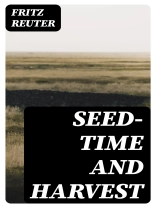In ‘Seed-time and Harvest, ‘ Fritz Reuter presents a profound exploration of rural life in 19th-century Germany through the lens of vivid character studies and regional dialects. This novel reflects the author’s mastery in using Low German dialect, offering an authentic and immersive experience that captures the complexities of peasant life, social change, and the indomitable human spirit. Its narrative intertwines humor and pathos, reflecting the societal transitions of the time, while Reuter’s keen eye for detail transports readers to the pastoral landscapes and customs of Northern Germany. Fritz Reuter, born in 1810 in a small village in Mecklenburgh, was deeply influenced by his own experiences in a rural setting and the socio-political upheavals of his era. Educated in various regions, including his studies in law, Reuter became a passionate advocate for the rights of the lower classes, and his works often emphasize the strength and resilience of ordinary people. His commitment to depicting the vernacular speech and local traditions of his homeland culminates in this novel, making it a significant contribution to regional literature. For readers seeking a rich tapestry of life that blends the charm of rural narrative with deeper social commentary, ‘Seed-time and Harvest’ is an essential read. It not only showcases Reuter’s linguistic brilliance but also invites readers to reflect on the cyclical nature of life, labor, and community. This work remains a testament to the enduring power of narrative in evoking empathy and understanding across generations.
Yazar hakkında
Fritz Reuter (1810-1874) was a German novelist and poet who remains a seminal figure in the Low German literature movement. Born in Stavenhagen, Mecklenburg-Vorpommern, he began his literary career after a tumultuous period that included university studies, participation in political activities, and subsequent imprisonment. His hardship imbued in him a sense of resilience which would later characterize his literary works. Reuter’s experiences deeply influenced his narratives, leading to a vivid depiction of 19th-century rural life in Mecklenburg. His magnum opus, ‘Seed-time and Harvest’ (‘Ut mine Stromtid’), is considered a high point of his literary accomplishments, entwining regional dialects and social commentaries that underscore his distinctive storytelling prowess. In ‘Seed-time and Harvest’, Reuter employs his profound knowledge of rural life to construct a world that is at once familiar and endearing, revealing a deep sense of humanity that transcends the provincial setting. His work is celebrated for its authenticity, humor, and empathetic portrayal of common folks, and has secured him a lasting place in the canon of German literature as a champion for the representation of the marginal voices through regional dialects and customs. Reuter’s contribution to literature extends beyond entertainment; it acts as a sociocultural document preserving the nuance of a time and place long past.












